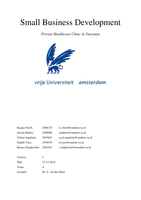Small Business Development
Private Healthcare Clinic in Tanzania
Kasper Forch 2568174 k.t.forch@student.vu.nl
Jeroen Hubers 2568468 j.huberts@student.vu.nl
Tobias Sapuletej 2563667 t.p.d.sapuletej@student.vu.nl
Daniël Veen 2558970 d.veen@student.vu.nl
Remco Zuijdervliet 2562435 r.zuijdervliet@student.vu.nl
Version 1
Date 12-12-2015
Team A
Lecturer Dr. F. van den Born
,Table of Contents
1. Overview of the Team Assignment ........................................................................................ 3
1.1 Core challenge .................................................................................................................. 3
1.2 Solution to the challenge ................................................................................................. 4
1.3 Structure of the report ..................................................................................................... 4
2. Introduction to the Context ................................................................................................... 5
2.1 Social Entrepreneurship ................................................................................................... 5
2.2 Challenges in sub-Saharan Africa ..................................................................................... 5
2.3 Challenges in the Private Healthcare Sector in sub-Saharan Africa................................. 6
3. The Challenges ....................................................................................................................... 7
3.1 Overview .......................................................................................................................... 7
3.1.1 Planning versus Improvisation .................................................................................. 7
3.1.2 Brokerage versus Closure ......................................................................................... 9
3.1.3 Homogeneity versus Diversity ................................................................................. 10
3.1.4 Legitimacy versus Informal Economy ..................................................................... 11
3.1.5 Managing Complex Environments .......................................................................... 13
3.2 The Main Challenge ........................................................................................................ 16
4. The Solution ......................................................................................................................... 18
4.1 Overall Solution .............................................................................................................. 18
4.2 Step by Step Solution ..................................................................................................... 18
4.2.1 Prior to hiring.......................................................................................................... 18
4.2.2 Internal .................................................................................................................... 19
4.2.3 External ................................................................................................................... 21
4.3 Recommendations ......................................................................................................... 22
5. Discussion and conclusion ................................................................................................... 24
5.1 Process of Identification and Explication of the Challenge ............................................ 24
5.2 Conclusion ...................................................................................................................... 25
6. Reflection on Team Work .................................................................................................... 26
7. References ........................................................................................................................... 27
2
, 1. Overview of the Team Assignment
Mr. Emmanuel is a social entrepreneur and the owner-manager of a Private Healthcare Clinic
(PHC) in Tanzania, Africa. The clinic is founded in 2011 and has gained some legitimacy in
the district and region. Further, it has established some ties with government officials and
local suppliers. Nevertheless, multiple issues inherent in Africa and the Private Healthcare
Sector (PHS) impede growth and development of the PHC.
Doing business in Africa is different than doing business in the Western world. Difficulties
primarily arise from the need for a balance between the social mission and profit making,
particularly in sub-Saharan Africa. In this area, four issues influence organizations, namely:
acute poverty, informality, colonial history, and ethnic group identity (Rivera-Santos, Holt,
Littlewood & Kolk, 2013). For social entrepreneurs in Tanzania, this means that (1) the
government or the private sector does not fulfill the basic needs of a population, but
organizations do, (2) informality is appreciated by the local community, (3) there is more
prosperity and there are more developed financial markets than in the rest of Africa, and (4)
the Ubuntu approach is important because many ethnic groups adopt this perspective.
In addition to the sub-Saharan African context, the PHS faces several issues. For example,
this sector needs a strong impetus for professionalization, in order to increase the quality of
life. However, legitimacy issues prevent the sector from being modernized, due to a large
proportion of local inhabitants preferring traditional health care.
In order to overcome several of these issues, this research aims to identify the core challenge
for the PHC, which is briefly explained below. Further, a solution with regard to this main
challenge is developed, and is also displayed below.
1.1 Core challenge
For the PHC itself, there are several challenges that demand attention, but one challenge in
particular: the internal and external networks of the clinic could be improved (Coleman,
1988; Burt, 2004). This challenge is important, because it may solve both internal and
external issues. First, the lack of an internal closure network is the basis for most tensions
within the PHC. These tensions are caused by cultural diversity, which enhances emotional
conflict, and in turn negatively influences performance (Pelled, Eisenhardt & Xin, 1999).
Further, the lack of internal closure impedes knowledge development, because there is
currently hardly any information sharing in the PHC. Developing an internal closure network
may help overcome these issues.
3





